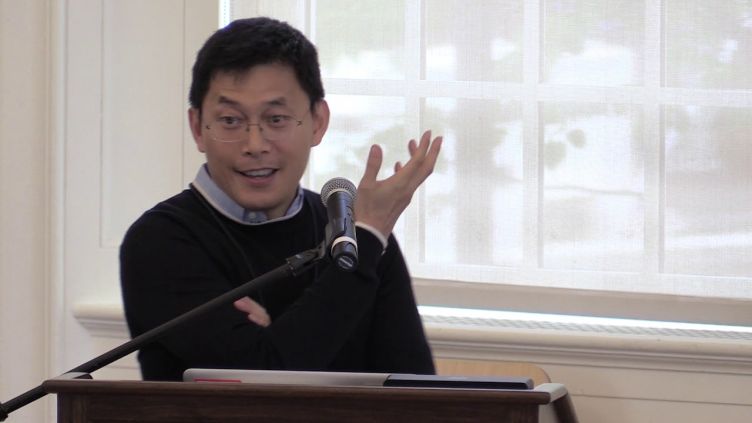Ten reasons to study Philosophy, Religion and Ethics at Sheffield
With internationally renowned scholars, a vibrant student and city environment and opportunities to tailor your degree to your interests, we share our top reasons to study these complex and fascinating subjects here in Sheffield.

Ten reasons to study Philosophy, Religion and Ethics at Sheffield
- 1. Philosophy, Religion and Ethics are important and relevant subjects.
-
Philosophy and Ethics examine the most fundamental questions in life, and the study of Religion helps you to critically examine beliefs and traditions that inform such views, and shape people’s identity, ethnicity, and behaviour. It is empowering to be familiar with complex debates, weigh up evidence, and to be able to argue in defence of your own views. Combining these subjects is fascinating, and mutually enhancing, as philosophical knowledge will be useful in the study of religion, while awareness of religious beliefs and cultural diversity will contribute to your philosophical insights.
- 2. Taught by experts
-
Our academics have published dozens of books and hundreds of research articles in leading philosophy journals and edited collections. We were ranked number two for the quality of our publications in the most recent Research Excellence Framework (2014), which is a periodic assessment of all university research in the UK. You will receive the highest quality education, informed by original research, no matter what particular areas interest you most. You will be taught by 22 members of the Philosophy department, as well as Sheffield’s leading scholars of Religion based in other departments, who examine religion from a wide variety of academic perspectives including History, Islamic Studies, Literary studies, Cultural Studies, Gender Studies, Social Science, and Philosophy of Religion.
- 3. Investment in learning and teaching excellence.
-
In addition to research eminence, the University of Sheffield is committed to Undergraduate studies, and the University invests in pedagogical research and innovation. Recent developments include implementing a University wide Programme Level Approach, aimed at ensuring that all Sheffield students get the best possible education and career preparation. The University Senate recognises learning and teaching excellence, and a number of academics teaching on the PRE degree have received an award for pedagogical excellence or innovation, in curriculum development or assessment. You will also benefit from central support services focused on improving your academic skills and helping you to achieve your full potential. All these reasons contribute to student satisfaction at Sheffield. The Department of Philosophy was rated 93% for student satisfaction in the 2019 National Student Survey.
- 4. Wide range of choice.
-
You will have the flexibility to focus on the topics in Philosophy, Religion, and Ethics that matter most to you. We offer a wide range of Philosophy and Ethics modules with both historical and contemporary focus, including specialist modules, developed by Sheffield philosophers based on their cutting-edge scholarship. These include modules in feminism, free will and religion, classical Chinese philosophy, and key thinkers such as Plato, Hegel, and Merleau-Ponty. Philosophy of Religion, and interdisciplinary modules in religious studies, history and literature also include both foundational modules as well as pioneering courses that examine religion and contemporary issues, such as virtue ethics, religion and popular culture, sexual violence, or migration studies.
- 5. Design your own degree programme
-
Our Philosophy, Religion and Ethics degree offers enormous flexibility, giving you a chance to study with Philosophers and experts on Religion in other departments. Our assessments are diverse and help you to develop a great range of skills, as you could prepare presentations, portfolios, and academic posters. You can also do ethnography, creative media projects, and digital assessments, and learn to communicate effectively. In your final year you have a chance to do a dissertation on a topic of your choice, supervised by one of our academics. Many dissertations explore students’ favourite topics further, or examine subjects related to their career interests, or to postgraduate studies they want to pursue.
- 6. A supportive environment.
-
We care about our students. Each student has a Personal Advisor in the Department throughout their degree, offering support in both academic and pastoral areas, such as helping you with module choice, reviewing your progress, and helping you to improve. We offer students the option of having a Philosophy Mentor, a student from the second or third year, to advise you during your first year at University. Our modules provide opportunities for discussion in small tutorial groups, or seminars. All our academics have weekly office hours when a student can have one-to-one meetings with their lecturers. And staff meet regularly with student representatives to listen to student concerns and get your perspectives on departmental policies, or programme development.
- 7. A chance to study abroad.
-
You have the opportunity to study abroad during your degree, choosing to take a year or a semester in another country rather than in Sheffield. We have study abroad programmes available with 34 Universities in Australia, Canada, Hong Kong, India, New Zealand, Singapore or USA, as well as Denmark, Germany, Greece, Italy or Spain.
- 8. An active community of students.
-
We are proud of the various projects which our students have set up on their own initiative. One of the most successful is Philosophy in the City, set up in 2006 by undergraduates wanting to start their own programme of teaching philosophy in local schools, particularly those in underprivileged areas. The award winning programme continues to flourish and has expanded into work with young persons’ homeless shelters and probation hostels. We also have extremely active Student Philosophy Society, social events, Philosophy sports teams, the Undergraduate Philosophy Journal ‘PhilonoUS’ which was set up and edited by our students, as well as seminars and events in the study of religion hosted by Sheffield Institute for Biblical Studies (SIIBS), and Postgraduate Studies in Religion.
- 9. A top University in a fantastic place to live.
-
You will also want to be at a university where you’ll have lots of extracurricular options, and in this respect you simply can’t do better than Sheffield. Our Students’ Union has been voted no. 1 in the UK (WhatUni Student Choice Awards 2019, 2018, 2017): with over 300 student societies, the Union offers something for everyone, and goes towards making Sheffield one of the best student cities in the UK. The city itself combines the benefits of a big city with the friendliness of a small town. Sheffield has a very active music and theatre scene, great shopping and cinema, fantastic nightlife, as well as vibrant churches, and faith communities. The Peak District offers great walks, climbing, or outdoor sports. Sheffield also has a low cost of living and is regarded as one of England’s safest major cities.
- 10. Excellent career prospects.
-
96% of 2016/17 Philosophy graduates secured employment or went into further study (Source: Destinations of Leavers from Higher Education 2016/17)
In the course of your degree you will learn to think clearly, to analyse complex issues carefully and to communicate your ideas in an articulate and persuasive manner. You will also develop cultural agility and understanding of contemporary issues and global diversity of cultures. Our graduates thrive in a range of careers, as you will grow in confidence, and develop a range of abilities, and transferable skills. We offer career advice and guidance throughout your degree, both within the Department and through the University’s excellent Careers Service, and directly career related modules.
Watch: the impact of studying Philosophy, Religion and Ethics
Watch Philosophy, Religion and Ethics lecturers Casey Strine and Josh Forstenzer discuss the 'good life' in this video taken at the Pedagogy of the Good Life Workshop at Yale Divinity School. This highlights one of the many contributions by the members of the department to international debate about teaching, and innovations that develop Higher Education Pedagogy.

